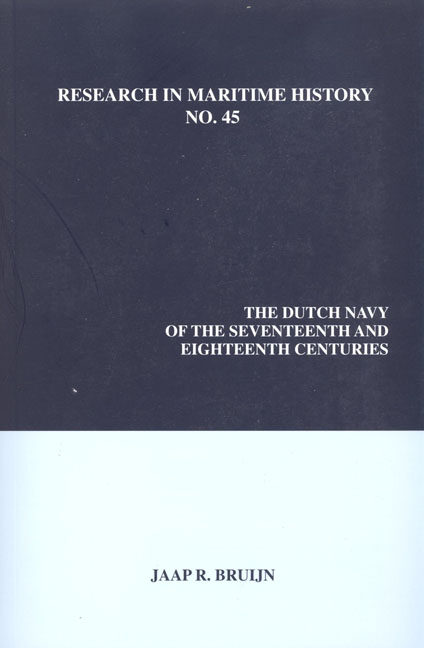Book contents
- Frontmatter
- Contents
- Illustrations
- Tables
- Series Editor's Foreword
- About the Author
- Introduction to the 2011 Edition
- Foreword
- Preface
- Introduction
- Map of the Dutch Republic
- Map of Dutch Naval Activity in European Waters
- Part One The “Old” Navy, Late 1500s-1652
- Part Two The “New” Navy, 1652-1713
- Part Three A Second-Rate Navy, 1714-1795
- Convoys and the Containment of the Barbary Corsairs
- Favouritism and Innovation
- Little Work, But More Education for the Naval Officer
- Naval Seaman, A Poor Man's Job
- Aftermath
- In Retrospect
- Bibliography
- Index
Little Work, But More Education for the Naval Officer
from Part Three - A Second-Rate Navy, 1714-1795
- Frontmatter
- Contents
- Illustrations
- Tables
- Series Editor's Foreword
- About the Author
- Introduction to the 2011 Edition
- Foreword
- Preface
- Introduction
- Map of the Dutch Republic
- Map of Dutch Naval Activity in European Waters
- Part One The “Old” Navy, Late 1500s-1652
- Part Two The “New” Navy, 1652-1713
- Part Three A Second-Rate Navy, 1714-1795
- Convoys and the Containment of the Barbary Corsairs
- Favouritism and Innovation
- Little Work, But More Education for the Naval Officer
- Naval Seaman, A Poor Man's Job
- Aftermath
- In Retrospect
- Bibliography
- Index
Summary
Several naval officers were actively involved in the discussions about the Nieuwe Diep and other port facilities, and some of these men, like William May, formulated alternative plans. The role played by naval officers in these proceedings shows that their skills had become wider and more varied than those of their counterparts a century before. A number of developments which had taken place with regard to educating and selecting naval officers made this increased participation in naval affairs a matter of course.
Far-reaching reforms in the education of naval officers had been introduced in the late 1740s. A junior naval officer had to pass certain exams before being eligible for promotion, a regulation instituted at Amsterdam in 1749 and at Rotterdam soon afterwards. The Zeeland admiralty introduced examination requirements in 1761, while the admiralties of the Noorderkwartier and Friesland waited until the 1780s to do so. The navigational knowledge of each lieutenant and commander was tested by an official examiner - at Amsterdam, by the famous Cornells Douwes. Lieutenants were required to procure good maps, protractors, dividers and textbooks on the art of navigation. Captains, as well as their officers and mates, were required to keep a log containing specific types of information. Inspection of these registers by examiners later became common. In 1787, a more detailed regulation outlining the data to be included in a captain's log was issued at Amsterdam. Naval officers were obliged to apply certain new methods in their navigation and to use specific instruments, although the five admiralties did not coordinate their initiatives in this respect.
Amsterdam and Rotterdam took the lead where innovations were concerned, a fact which implies that at least three-quarters of the entire corps of Dutch naval officers were affected by every new measure instituted. It became difficult for officers to avoid acquiring a solid knowledge of mathematics and the modern methods for the determination of latitude, longitude and compass variation. They were no longer free to follow their own navigational techniques. Yet many officers took so great an interest in the required subjects that they actually became quite learned - several of them, in fact, so erudite that they accepted membership in various scientific societies. Among these men were Van Kinsbergen, Melvill, William May, Zoutman, Lodewijk graaf van Bylandt and his nephew Frederik Sigismund graaf van Bylandt, Andreas van den Velden and Johan Splinter Stavorinus.
- Type
- Chapter
- Information
- The Dutch Navy of the Seventeenth and Eighteenth Centuries , pp. 153 - 169Publisher: Liverpool University PressPrint publication year: 2011



